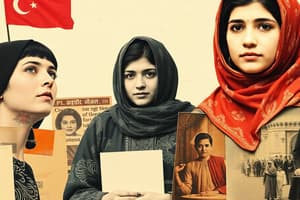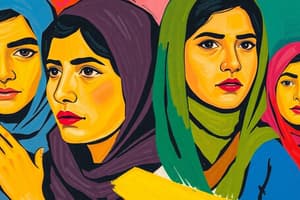Podcast
Questions and Answers
Considering Malala's introspective dialogues with her reflection, what latent psychological mechanism might explain her propensity for public speaking amidst societal upheaval?
Considering Malala's introspective dialogues with her reflection, what latent psychological mechanism might explain her propensity for public speaking amidst societal upheaval?
- A nascent form of **dissociative identity disorder**, triggered by the trauma of living under Taliban rule, leading to the creation of an alter ego capable of confronting oppression.
- A manifestation of _folie à deux_, wherein Malala projected her internal convictions onto a fabricated external audience to alleviate cognitive dissonance arising from the Taliban's edicts.
- A preemptive rehearsal strategy underpinned by **self-efficacy theory**, enabling her to vicariously experience successful advocacy, thereby bolstering her confidence to engage in real-world activism. (correct)
- A subconscious adoption of **learned helplessness**, paradoxically compelling her to engage in performative activism within the confines of her personal space as a means of coping with powerlessness.
Given Radio Mullah’s decree, and considering the structural vulnerabilities within Swat society, what game-theoretic model best illustrates the strategic interactions between the Taliban, the local populace, and the Pakistani government?
Given Radio Mullah’s decree, and considering the structural vulnerabilities within Swat society, what game-theoretic model best illustrates the strategic interactions between the Taliban, the local populace, and the Pakistani government?
- A **cooperative game** with transferable utility, where the Taliban and segments of the local populace collude to maximize their collective payoff by suppressing female education, while strategically minimizing conflict with the government.
- A **zero-sum game** characterized by the Taliban's absolute dominance, where any gain for female education directly translates to an equivalent loss for the Taliban, resulting in a brutal enforcement of their draconian policies.
- An **evolutionary game** whereby the cultural norms dictated by the Taliban gradually permeate the social fabric, shifting societal beliefs and behaviors towards acceptance of their dictates, irrespective of governmental policies.
- A **Bayesian game** of incomplete information, wherein the Taliban's true resolve and the government's commitment to intervention are uncertain, leading to a mixed-strategy Nash equilibrium favoring the Taliban's agenda due to widespread fear. (correct)
Considering the socio-political climate described, what cognitive bias most likely influenced the initial dismissal of Radio Mullah's edict by Malala and her peers?
Considering the socio-political climate described, what cognitive bias most likely influenced the initial dismissal of Radio Mullah's edict by Malala and her peers?
- The **availability heuristic**, whereby recent exposure to instances of governmental intervention led to an overestimation of the likelihood of effective countermeasures against the Taliban.
- The **optimism bias**, predisposing them to underestimate the probability of the edict's enforcement based on a generalized belief in a positive future outcome despite prevailing evidence to the contrary. (correct)
- The **bandwagon effect**, leading to a collective underestimation of the Taliban's capabilities due to prevailing group norms that minimized the perceived threat.
- The **ostrich effect**, causing a deliberate avoidance of threatening information regarding the edict's potential consequences to alleviate anxiety and maintain a sense of normalcy.
In the context of the Taliban's actions and Malala's resistance, what parallels can be drawn with classical philosophical discourse on the conflict between individual rights and the collective will, particularly referencing thinkers such as John Stuart Mill and Thomas Hobbes?
In the context of the Taliban's actions and Malala's resistance, what parallels can be drawn with classical philosophical discourse on the conflict between individual rights and the collective will, particularly referencing thinkers such as John Stuart Mill and Thomas Hobbes?
From a Foucauldian perspective, how does Radio Mullah's decree function as a mechanism of power within the Swat Valley community, and what counter-strategies might Malala's activism represent?
From a Foucauldian perspective, how does Radio Mullah's decree function as a mechanism of power within the Swat Valley community, and what counter-strategies might Malala's activism represent?
Assuming the long-term objective of the Taliban is to establish a theocratic state, how does the prohibition of female education serve as a strategic instrument within a broader framework of societal control and ideological propagation?
Assuming the long-term objective of the Taliban is to establish a theocratic state, how does the prohibition of female education serve as a strategic instrument within a broader framework of societal control and ideological propagation?
In the context of complex societal dynamics, what could be the unintended consequences of Radio Mullah's ban on female education on the long-term sociological and economic viability of Swat society?
In the context of complex societal dynamics, what could be the unintended consequences of Radio Mullah's ban on female education on the long-term sociological and economic viability of Swat society?
Considering the historical context of Swat and the broader geopolitical landscape, how might Radio Mullah's ban on female education be interpreted as a manifestation of neocolonial influence, and what resistance strategies could effectively counteract such influence?
Considering the historical context of Swat and the broader geopolitical landscape, how might Radio Mullah's ban on female education be interpreted as a manifestation of neocolonial influence, and what resistance strategies could effectively counteract such influence?
Evaluating Malala's commentary about lecturing an empty classroom, how do these actions reflect or deviate from established pedagogical theories concerning student engagement, self-directed learning, and the construction of knowledge?
Evaluating Malala's commentary about lecturing an empty classroom, how do these actions reflect or deviate from established pedagogical theories concerning student engagement, self-directed learning, and the construction of knowledge?
Flashcards
Malala's Speeches
Malala's Speeches
Malala spoke out against oppression during Swat attacks in 2008.
Radio Mullah
Radio Mullah
The radio host who announced an edict against girls' education.
January Edict
January Edict
A declaration forbidding girls from attending school after January 15, 2009.
Taliban's Impact
Taliban's Impact
Signup and view all the flashcards
Hopefulness
Hopefulness
Signup and view all the flashcards
Debating in Class
Debating in Class
Signup and view all the flashcards
Empowerment through Speech
Empowerment through Speech
Signup and view all the flashcards
Educational Rights
Educational Rights
Signup and view all the flashcards
Fear and Resistance
Fear and Resistance
Signup and view all the flashcards
Study Notes
Malala's Diary Entry
- Malala describes a humorous interaction, using the term "Pisho", regarding bathroom use.
- She reflects on a self-image, feeling like a speaker to the world, even in a bathroom mirror.
- She relates a specific event in 2008, where a decree was imposed preventing girls from attending school on January 15th.
- The decree was broadcast on Radio Mullah.
- Malala questions how one person can stop thousands of girls from attending school.
- She expresses her belief that girls have the right to learn.
- She states her friends find her optimistic, perhaps even crazy, for believing the situation is reversible.
- Her classmates express doubt that anyone can stop the Taliban's destructive activities related to schools.
Studying That Suits You
Use AI to generate personalized quizzes and flashcards to suit your learning preferences.




